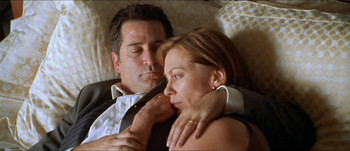Twitter Review: The Assassination of Jesse James by the Coward Robert Ford
For 2 hours, ‘TAOJJBTCRF’ seems to wander enigmatically with a sharp eye. But its final 30 minutes pierce as themes coalesce novelistically.
For 2 hours, ‘TAOJJBTCRF’ seems to wander enigmatically with a sharp eye. But its final 30 minutes pierce as themes coalesce novelistically.
The consensus apex of the Star Trek films, ‘Khan’ opens as slowly as its forebear and only eclipses it when the Genesis and Spock plots meet
Once you get past the torpid first hour, 1979’s ‘Star Trek’ is shockingly compelling – a leisurely puzzle that presages ‘BSG’ and its themes
‘Up’ made me cry at least twice, but its well-supported message undercut its admittedly spectacular spectacle. That’s its point and problem.
‘Star Trek’ – Brisk, elegant, and thin, Abrams’ reboot draws its gravity from Leonard Nimoy, funny and illogically emotional. Pegg is a hoot
‘JCVD’ – Not as smart as it thinks it is, but still potent. Van Damme effectively exploits his irrelevance for laughs & pathos. Too stylized
 The conventional wisdom says that among the early entrants in the summer 2009 sweepstakes, Star Trek is a hit (and a winner in its first three weekends in our Box Office Power Rankings), Wolverine is a disappointment, and nobody cares about Angels and Demons. Yet X-Men Origins: Wolverine had the biggest North American opening of the three: $85 million. These evaluations are muddied by so many variables that it’s difficult to cut through the crap. But one simple measure is second-weekend drop-off, generally considered a reliable indicator of a movie’s staying power. So: Wolverine dropped 69.0 percent from $85 million; Star Trek dropped 42.8 percent from $75 million; and Angels and Demons dropped 53.0 percent (not counting the Monday holiday) from $46 million.
The conventional wisdom says that among the early entrants in the summer 2009 sweepstakes, Star Trek is a hit (and a winner in its first three weekends in our Box Office Power Rankings), Wolverine is a disappointment, and nobody cares about Angels and Demons. Yet X-Men Origins: Wolverine had the biggest North American opening of the three: $85 million. These evaluations are muddied by so many variables that it’s difficult to cut through the crap. But one simple measure is second-weekend drop-off, generally considered a reliable indicator of a movie’s staying power. So: Wolverine dropped 69.0 percent from $85 million; Star Trek dropped 42.8 percent from $75 million; and Angels and Demons dropped 53.0 percent (not counting the Monday holiday) from $46 million.
‘The Wrester’: Rourke lives the role beautifully, but the first-half character-study authenticity devolves into inevitable, overplayed story
‘Lost’ S5 finale: Josh Holloway proves himself the worst among many bad actors; the suspense is less “What happens next?!” than “Where now?”
 Much to my surprise, I can find no reference to the nearly universal cinematic “wedding-ring rule”: Any time a wedding ring is a prominent prop or visual motif in a movie, infidelity will be a central theme. The obverse: Any movie with infidelity as a central theme will feature the wedding ring as a prop or visual motif. I could offer dozens of examples, but the best might be Lantana, which is obviously about sexual straying but has a greater interest in marriage overall, especially the underlying, intertwined issues of trust and honesty. Although it’s nearly too blunt in its themes, the movie feels continuously right, nailing not only relationship dynamics but interred grief and pain. Throughout, it gets the tone, nuance, and scale of life correct.
Much to my surprise, I can find no reference to the nearly universal cinematic “wedding-ring rule”: Any time a wedding ring is a prominent prop or visual motif in a movie, infidelity will be a central theme. The obverse: Any movie with infidelity as a central theme will feature the wedding ring as a prop or visual motif. I could offer dozens of examples, but the best might be Lantana, which is obviously about sexual straying but has a greater interest in marriage overall, especially the underlying, intertwined issues of trust and honesty. Although it’s nearly too blunt in its themes, the movie feels continuously right, nailing not only relationship dynamics but interred grief and pain. Throughout, it gets the tone, nuance, and scale of life correct.